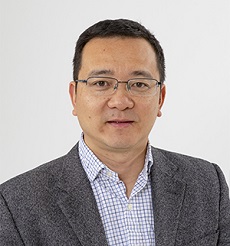
Prof. Honggang Wang
Title: Iot For Smart And Connected Health
Bio:
Honggang Wang is a professor of Electrical and Computer Engineering at UMass Dartmouth. His research interests include Internet of Things (IoT), Wireless Health, Body Area Networks (BAN), Cyber and Multimedia Security, Mobile Multimedia and Cloud, Wireless Networks and Cyber-physical System, and BIG DATA in mHealth. He has published more than 200 papers in his research areas. He is an alumnus of National Academic Engineering (NAE) Frontiers of Engineering program. He has been serving as the Editor in Chief (EiC) for IEEE Internet of Things journal since 2020. He was the past Chair (2018-2020) of IEEE Multimedia Communications Technical Committee and is the Chair of IEEE eHealth Committee (2020-2021). He is an IEEE Distinguished Lecturer (ComSoc, 2019-2020) and an IEEE Fellow for his contributions to low power wireless for IoT and multimedia applications.
Abstract:
Smart and Connected Health (SCH) is the use of Internet, sensing, communications and intelligent techniques in support of healthcare applications. Internet of Things (IoT) systems such as Wireless body area network (WBAN) system with various types of biomedical sensors is one of key infrastructures of SCH and provide an opportunity to address issues in rapidly increasing mHealth/eHealth applications. However, there are significant challenges in this area, such as improving the performance of WBANs, analytics of large and continuous physiological data collected from biomedical sensors and predictive modeling, and securing data transmission and protecting data privacy, especially in mobile and wireless environments. In this talk, I will present the research trends, challenges and potential IoT solutions in the related areas including the introduction of two case studies: (1) developing a wearable biosensor system for the remote detection of life threatening events in infants; (2) a security system to support reliable and secured data transmissions over WBANs.
 Prof. Shiwen Mao
Prof. Shiwen Mao
Title: Vision-aided 3D Human Pose Estimation with RFID: Design, Implementation, and Generalization
Bio:
SHIWEN MAO received his Ph.D. in electrical engineering from Polytechnic University, Brooklyn, NY in 2004. He joined the Department of Electrical and Computer Engineering, Auburn University, Auburn, AL in 2006, and held the McWane Endowed Professorship from 2012 to 2015 and the Samuel Ginn Endowed Professorship from 2015 to 2020. Currently, he is a professor and Earle C. Williams Eminent Scholar Chair, and Director of the Wireless Engineering Research and Education Center at Auburn University. His research interest includes wireless networks, multimedia communications, and smart grid. He is an Associate Editor-in-Chief of IEEE/CIC China Communications, an Area Editor of IEEE Transactions on Wireless Communications, IEEE Internet of Things Journal, IEEE Open Journal of the Communications Society, and ACM GetMobile, and an Associate Editor of IEEE Transactions on Cognitive Communications and Networking, IEEE Transactions on Network Science and Engineering, IEEE Transactions on Mobile Computing, IEEE Multimedia, and IEEE Networking Letters, among others. He is a Distinguished Lecturer of IEEE Communications Society and Distinguished Speaker of IEEE Vehicular Technology Society. He is the TPC Co-Chair of IEEE INFOCOM 2018 and the TPC Vice Chair of IEEE GLOBECOM 2022. He received the IEEE TC-CSR Distinguished Technical Achievement Award in 2019 and NSF CAREER Award in 2010. He is a co-recipient of the IEEE Vehicular Technology Society 2020 Jack Neubauer Memorial Award, the IEEE MMTC 2018 Best Journal Award and 2017 Best Conference Paper Award, the Best Demo Award from IEEE SECON 2017, the Best Paper Awards from IEEE GLOBECOM 2019, 2016 & 2015, IEEE WCNC 2015, and IEEE ICC 2013, and the 2004 IEEE Communications Society Leonard G. Abraham Prize in the Field of Communications Systems. He is a Fellow of the IEEE and EAI.
Abstract:
In recent years, 3D human pose tracking has become an important topic in computer vision (CV). It is a more challenging problem than classification problems such as human activity recognition, and is the enabler of many advanced CV applications. To improve the privacy of human pose tracking, there is considerable interest in techniques without using a video camera. To this end, RFID tags, as a low-cost wearable sensor, provide an effective solution for 3D human pose tracking. In this talk, we first present RFID-Pose, a vision-aided realtime 3D human pose estimation system based on deep learning. The RFID phase data is calibrated to effectively mitigate the severe phase distortion, and High Accuracy Low Rank Tensor Completion (HaLRTC) is employed to impute missing RFID samples. The system then estimates the spatial rotation angle of each human limb, and utilizes the rotation angles to reconstruct human pose in realtime with the forward kinematic technique. The second part of this talk addresses the user adaptation problem, when a well-trained system is used to monitor the 3D pose of a new subject. We propose Cycle-Pose, a user-adaptive realtime 3D human pose estimation system. A cycle kinematic network is proposed to remove the restriction in pairing RFID and vision data for training. The resulting system is user-adaptive, achieved by learning to transform the RFID data into a human skeleton for different subjects. The third part of this talk addresses the environment adaptation problem, when a well-trained system is applied in a new environment. Meta-learning, as an effective technique to improve the model adaptability, is leveraged as a promising solution to the generalization problem. We develop an RFID based pose estimation system, termed Meta-Pose, which is based on the meta-learning framework to address the generalization problem. The three systems are prototyped with commodity RFID devices and validated with extensive experiments, where high pose estimation accuracy and realtime operation are demonstrated.

Prof. Shaoen Wu
Title: Deep Wireless Human Activity Imaging and Recognition
Bio:
Prof. Shaoen Wu is currently the State Farm Endowed Chair Full Professor, in the School of Information Technology at Illinois State University. He is also the founding Director of Center for Cybersecurity Research and Education. Priorly, he worked at Ball State University where he served as the Director of the Security and Software Engineering Research Center, an NSF/IUCRC international research center of five universities, and other roles including Advisory Council of Scholarship for the Vice President for Research and the Dean’s Faculty Advisory Board. He also worked for University of Southern Mississippi, Adtran Inc. and Bell-Labs. Prof. Wu has published over 80 peer-reviewed journal or conference proceeding papers. His research has been generously supported with over $3M grants by NSF, NASA, Cisco, Lockheed Martin, Air Force Research Laboratory, NVIDIA, Intel, Dell, ARM, Cypress Inc., and Microsoft. He has received three Best Paper Awards and numerous service awards.
Abstract:
Traditional human activity recognition solutions are mostly based on wearables that result in inconvenience to users or video cameras that require lightness and likely lead to privacy issues. This talk reviews the wireless based human activity sensing and solutions, and then presents a deep learning based ambient radar wireless sensing solution that is a real-time, privacy preservative, and lightness-resistant system. This solution adopts a low power, Frequency-Modulated Continuous Wave (FMCW) radar array to capture the reflected signals from a user and then constructs 3D image frames from the wireless radar signals. From the 3D imaging, another deep learning model is built to recognize various human activities from the 3D imaging.

Prof. Yan Zhang
University of Oslo, Norway
Title: Digital Twin for 6G and IoT
Bio:
Yan Zhang is a Full Professor at Department of Informatics, University of Oslo, Norway. He received a Ph.D. degree in School of Electrical & Electronics Engineering, Nanyang Technological University, Singapore. He received M.S. and B.S from Beihang University and Nanjing University of Post and Telecommunications, respectively. His current research interests include: 6G and Internet of Things (e.g., transport, smart grid). He received the prestigious award Clarivate Analytics (previously Thomson Reuters) “Highly Cited Researcher” since 2018.
He is IEEE Fellow and IET Fellow. He is an elected Fellow of Academia Europaea (MAE), an elected Fellow of Royal Norwegian Society of Sciences and Letters Academy (DKNVS) and an elected Fellow of Norwegian Academy of Technological Sciences (NTVA). He serves as the Chair of IEEE ComSoc TCGCC (Technical Committee on Green Communications & Computing) during 2019-2021. He is IEEE Communication Society Distinguished Lecturer and IEEE Vehicular Technology Society (VTS) Distinguished Speaker. He was IEEE VTS Distinguished Lecturer for two terms (2016-2018 and 2018-2020). He is a member of IEEE VTS Fellowship and Scholarship Committee. He is currently serving as an Area Editor/Senior Editor/Editor of 11 IEEE Transactions/Magazines, including IEEE Communications Magazine; IEEE Network Magazine; IEEE Communications Surveys & Tutorials; IEEE Transactions on Network Science and Engineering; IEEE Transactions on Industrial Informatics; IEEE Transactions on Vehicular Technology; IEEE Transactions on Green Communications and Networking; IEEE Internet of Things Journal; IEEE Systems Journal; IEEE Vehicular Technology Magazine and IEEE Blockchain Technical Briefs.
Abstract:
In this talk, we mainly introduce our recent studies on Digital Twin for Edge Computing, 6G, and IoT. We will first present Digital Twin concepts and models; as well as our proposed new research paradigm DITEN (Digital Twin Edge Networks). Then, we focus on research problems related to: (i) federated learning for DITEN; (ii) Blockchain and federated learning for DITEN; and (iii) edge association as a unique research challenge in Digital Twin for 6G and IoT. Finally, we point out open research questions for further study.
